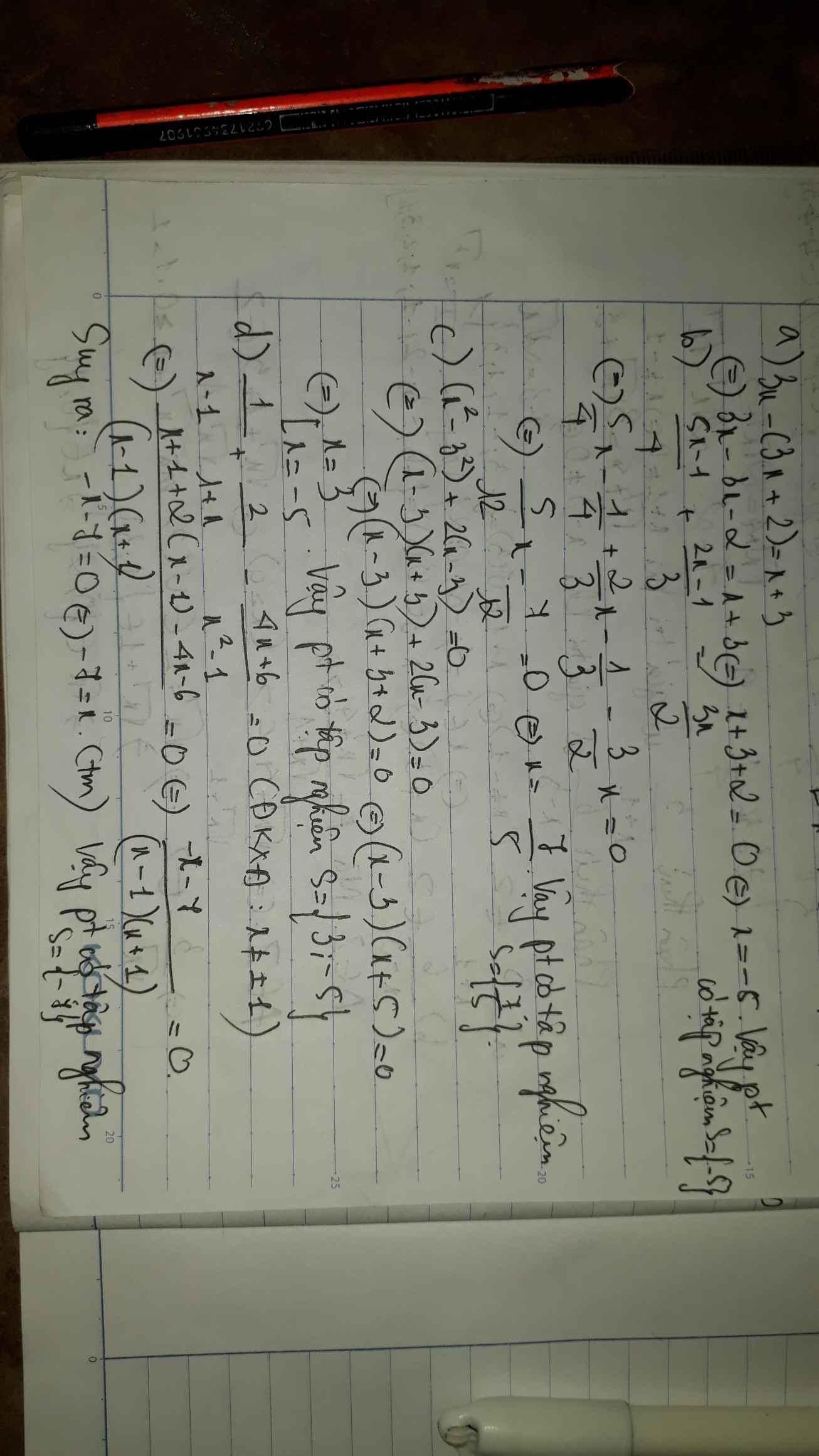giải phương trình
\(\dfrac{2x-1}{x^2-4x+4} + \dfrac{5x}{x-2} - \dfrac{25x}{5x-10} = 0\)

Những câu hỏi liên quan
Giải các phương trình sau:
a) \(\sqrt{25x^2-9}-2\sqrt{5x+3}=0\)
b) \(\dfrac{\sqrt{x-3}}{\sqrt{2x+1}}=2\)
c) \(\sqrt{x^2-2x+1}+\sqrt{x^2-4x+4}=3\)
a)ĐK:\(\begin{cases}25x^2-9 \ge 0\\5x+3 \ge 0\\\end{cases}\)
`<=>` \(\begin{cases}(5x-3)(5x+3) \ge 0\\5x+3 \ge 0\\\end{cases}\)
`<=>` \(\begin{cases}\left[ \begin{array}{l}x\ge \dfrac35\\x \le -\dfrac35\end{array} \right.\\\end{cases}\)
`<=>` \(\left[ \begin{array}{l}x=-\dfrac35\\x \ge \dfrac35\end{array} \right.\)
`pt<=>\sqrt{5x+3}(\sqrt{5x-3}-2)=0`
`<=>` \(\left[ \begin{array}{l}5x+3=0\\\sqrt{5x-3}=2\end{array} \right.\)
`<=>` \(\left[ \begin{array}{l}x=-\dfrac35\\5x-3=4\end{array} \right.\)
`<=>` \(\left[ \begin{array}{l}x=-\dfrac35\\x=7/5\end{array} \right.\)
`b)sqrt{x-3}/sqrt{2x+1}=2`
ĐK:\(\begin{cases}x-3 \ge 0\\2x+1>0\\\end{cases}\)
`<=>x>=3`
`pt<=>sqrt{x-3}=2sqrt{2x+1}`
`<=>x-3=8x+4`
`<=>7x=7`
`<=>x=1(l)`
`c)sqrt{x^2-2x+1}+sqrt{x^2-4x+4}=3`
`<=>sqrt{(x-1)^2}+sqrt{(x-2)^2}=3`
`<=>|x-1|+|x-2|=3`
`**x>=2`
`pt<=>x-1+x-2=3`
`<=>2x=6`
`<=>x=3(tm)`
`**x<=1`
`pt<=>1-x+2-x=3`
`<=>3-x=3`
`<=>x=0(tm)`
`**1<=x<=2`
`pt<=>x-1+2-x=3`
`<=>=-1=3` vô lý
Vậy `S={0,3}`
Đúng 1
Bình luận (0)
Giải phương trình:
1. \(5x^2+2x+10=7\sqrt{x^4+4}\)
2. \(\dfrac{4}{x}+\sqrt{x-\dfrac{1}{x}}=x+\sqrt{2x-\dfrac{5}{x}}\)
3. \(\sqrt{x^2+2x}=\sqrt{3x^2+4x+1}-\sqrt{3x^2+4x+1}\)
Giải phương trình
a) \(\dfrac{3}{5x-1}\)+ \(\dfrac{2}{3-5x}\)=\(\dfrac{4}{\left(1-5x\right)\left(x-3\right)}\)
b) \(\dfrac{5-x}{4x^2-8x}\)+\(\dfrac{7}{8x}\)=\(\dfrac{x-1}{2x\left(x-2\right)}\)+\(\dfrac{1}{8x-16}\)
a:Sửa đề: \(\dfrac{3}{5x-1}+\dfrac{2}{3-x}=\dfrac{4}{\left(1-5x\right)\left(x-3\right)}\)
=>3x-9-10x+2=-4
=>-7x-7=-4
=>-7x=3
=>x=-3/7
b: =>\(\dfrac{5-x}{4x\left(x-2\right)}+\dfrac{7}{8x}=\dfrac{x-1}{2x\left(x-2\right)}+\dfrac{1}{8\left(x-2\right)}\)
=>\(2\left(5-x\right)+7\left(x-2\right)=4\left(x-1\right)+x\)
=>10-2x+7x-14=4x-4+x
=>5x-4=5x-4
=>0x=0(luôn đúng)
Vậy: S=R\{0;2}
Đúng 1
Bình luận (0)
Giải phương trình sau :
a,\(\dfrac{7-3x}{12}+\dfrac{5x+2}{7}=x+13\)
b,\(\dfrac{3\left(x+3\right)}{4}-\dfrac{1}{2}=\dfrac{5x+9}{7}-\dfrac{7x-9}{4}\)
c,\(\dfrac{2x+1}{3}-\dfrac{5x+2}{7}=x+3\)
d,\(\dfrac{2x-3}{3}-\dfrac{2x+3}{7}=\dfrac{4x+3}{5}-17\)
a: \(\Leftrightarrow7\left(7-3x\right)+12\left(5x+2\right)=84\left(x+13\right)\)
\(\Leftrightarrow49-21x+60x+24=84x+1092\)
\(\Leftrightarrow39x-84x=1092-73\)
=>-45x=1019
hay x=-1019/45
b: \(\Leftrightarrow21\left(x+3\right)-14=4\left(5x+9\right)-7\left(7x-9\right)\)
=>21x+63-14=20x+36-49x+63
=>21x+49=-29x+99
=>50x=50
hay x=1
c: \(\Leftrightarrow7\left(2x+1\right)-3\left(5x+2\right)=21x+63\)
=>14x+7-15x-6-21x-63=0
=>-22x-64=0
hay x=-32/11
d: \(\Leftrightarrow35\left(2x-3\right)-15\left(2x+3\right)=21\left(4x+3\right)-17\cdot105\)
=>70x-105-30x-45=84x+63-1785
=>40x-150-84x+1722=0
=>-44x+1572=0
hay x=393/11
Đúng 0
Bình luận (0)
a, msc 12.7=84
Chuyển vế về =0 rồi làm
b,msc 28
c,làm tương tự
Đúng 0
Bình luận (0)
a, \(\Rightarrow49-21x+60x+24=84x+1092\)
\(\Leftrightarrow-45x=1019\Leftrightarrow x=-\dfrac{1019}{45}\)
b, \(\Rightarrow21\left(x+3\right)-14=4\left(5x+9\right)-7\left(7x-9\right)\)
\(\Leftrightarrow21x+63-14=20x+36-49x+63\)
\(\Leftrightarrow50x=50\Leftrightarrow x=1\)
c, \(\Rightarrow14x+7-15x-6=21x+63\Leftrightarrow-22x=62\Leftrightarrow x=-\dfrac{31}{11}\)
d, \(\Rightarrow35\left(2x-3\right)-15\left(2x+3\right)=21\left(4x+3\right)-105.17\)
\(\Leftrightarrow70x-105-30x-45=84x+63-1785\)
\(\Leftrightarrow-44x=-1572\Leftrightarrow x=\dfrac{393}{11}\)
Đúng 0
Bình luận (0)
Xem thêm câu trả lời
Giải phương trình:
a)\(2x^3+4x^2+10x=0\)
b)\(\dfrac{x^2-4x}{x^2-5x+4}-\dfrac{1}{2}=\dfrac{x+1}{x-3}\)
a: \(\Leftrightarrow2x\left(x^2+2x+5\right)=0\)
=>x=0
b: \(\Leftrightarrow\dfrac{x}{x-1}-\dfrac{x+1}{x-3}=\dfrac{1}{2}\)
\(\Leftrightarrow x^2-4x+3=2x\left(x-3\right)-2\left(x^2-1\right)\)
\(\Leftrightarrow x^2-4x+3=2x^2-6x-2x^2+2=-6x+2\)
\(\Leftrightarrow x^2+2x+1=0\)
=>x=-1(nhận)
\(\Leftrightarrow2x\left(x^2+2x+5\right)=0\)
\(\Leftrightarrow x=0\) ( vì \(x^2+2x+5>0;\forall x\)
b.\(\Leftrightarrow\dfrac{x\left(x-4\right)}{\left(x-1\right)\left(x-4\right)}-\dfrac{1}{2}=\dfrac{x+1}{x-3}\)
\(ĐK:x\ne1;3;4\)
\(\Leftrightarrow\dfrac{x}{\left(x-1\right)}-\dfrac{1}{2}=\dfrac{x+1}{x-3}\)
\(\Leftrightarrow\dfrac{x\left(x-3\right)-\left(x-1\right)\left(x-3\right)}{\left(x-1\right)\left(x-3\right)}=\dfrac{\left(x+1\right)\left(x-1\right)}{\left(x-1\right)\left(x-3\right)}\)
\(\Leftrightarrow x\left(x-3\right)-\left(x-1\right)\left(x-3\right)=\left(x+1\right)\left(x-1\right)\)
\(\Leftrightarrow x^2-3x-\left(x^2-3x-x+3\right)=x^2-1\)
\(\Leftrightarrow x^2-3x-x^2+4x-3=x^2-1\)
\(\Leftrightarrow x^2+x-2=0\)
\(\Leftrightarrow x^2-x+2x-2=0\)
\(\Leftrightarrow x\left(x-1\right)+2\left(x-1\right)=0\)
\(\Leftrightarrow\left(x-1\right)\left(x+2\right)=0\)
\(\Leftrightarrow\left[{}\begin{matrix}x=1\left(ktm\right)\\x=-2\left(tm\right)\end{matrix}\right.\)
Vậy \(S=\left\{-2\right\}\)
\(a,2x^3+4x^2+10x=0\\ \Leftrightarrow2x\left(x^2+2x+5\right)=0\\ \Leftrightarrow\left[{}\begin{matrix}2x=0\\x^2+2x+5=0\end{matrix}\right.\\ \Leftrightarrow\left[{}\begin{matrix}x=0\\\left(x^2+2x+1\right)+4=0\end{matrix}\right.\\ \Leftrightarrow\left[{}\begin{matrix}x=0\\\left(x+1\right)^2+4=0\left(vô..lí\right)\end{matrix}\right.\)
\(b,ĐKXĐ:\left\{{}\begin{matrix}x\ne1\\x\ne3\\x\ne4\end{matrix}\right.\\ \dfrac{x^2-4x}{x^2-5x+4}-\dfrac{1}{2}=\dfrac{x+1}{x-3}\\ \Leftrightarrow\dfrac{x\left(x-4\right)}{\left(x-1\right)\left(x-4\right)}-\dfrac{1}{2}=\dfrac{x+1}{x-3}\\ \Leftrightarrow\dfrac{x}{x-1}-\dfrac{1}{2}-\dfrac{x+1}{x-3}=0\\ \Leftrightarrow\dfrac{2x\left(x-3\right)}{2\left(x-1\right)\left(x-3\right)}-\dfrac{\left(x-1\right)\left(x-3\right)}{2\left(x-1\right)\left(x-3\right)}-\dfrac{2\left(x+1\right)\left(x-1\right)}{2\left(x-1\right)\left(x-3\right)}=0\)
\(\Leftrightarrow\dfrac{2x^2-6x}{2\left(x-1\right)\left(x-3\right)}-\dfrac{x^2-4x+3}{2\left(x-1\right)\left(x-3\right)}-\dfrac{2x^2-2}{\left(x-1\right)\left(x-3\right)}=0\)
\(\Leftrightarrow\dfrac{2x^2-6x-x^2+4x-3-2x^2+2}{2\left(x-1\right)\left(x-3\right)}=0\)
\(\Rightarrow-x^2-2x-1=0\)
\(\Leftrightarrow x^2+2x+1=0\\ \Leftrightarrow\left(x+1\right)^2=0\\ \Leftrightarrow x+1=0\\ \Leftrightarrow x=-1\left(tm\right)\)
Đúng 0
Bình luận (0)
giải các phương trình sau
a, 3x -(3x+2) =x+3
b, \(\dfrac{5x-1}{4}+\dfrac{2x-1}{3}=\dfrac{3x}{2}\)
c, \(\left(x^2-3^2\right)+2\left(x-3\right)=0\)
d,\(\dfrac{1}{x-1}+\dfrac{2}{1+x}-\dfrac{4x+6}{x^2-1}=0\)
a: Ta có: \(3x-\left(3x+2\right)=x+3\)
\(\Leftrightarrow x+3=-2\)
hay x=-5
b: Ta có: \(\dfrac{5x-1}{4}+\dfrac{2x-1}{3}=\dfrac{3x}{2}\)
\(\Leftrightarrow15x-3+8x-4=18x\)
\(\Leftrightarrow5x=7\)
hay \(x=\dfrac{7}{5}\)
Đúng 0
Bình luận (0)
Giải các phương trình
\(1,\dfrac{5x-1}{3}-1=2x+3\)
\(2,16x^2-3=\left(4x-3\right)\left(5x+1\right)\)
\(3,\dfrac{x-2}{x+2}-\dfrac{3}{x-2}=\dfrac{-x\left(15-x\right)}{x^2-4}\)
:)
\(1,\dfrac{5x-1}{3}-1=2x+3\\ \Leftrightarrow\dfrac{5x-4}{3}=2x+3\\ \Leftrightarrow5x-4=3\left(2x+3\right)\\ \Leftrightarrow5x-4=6x+9\\ \Leftrightarrow6x+9-5x+4=0\\ \Leftrightarrow x+13=0\\ \Leftrightarrow x=-13\)
\(2,16x^2-3=\left(4x-3\right)\left(5x+1\right)\\ \Leftrightarrow16x^2-3=20x^2-15x+4x-3\\ \Leftrightarrow16x^2-3=20x^2-11x-3\\ \Leftrightarrow20x^2-11x-3-16x^2+3=0\\ \Leftrightarrow4x^2-11x=0\\ \Leftrightarrow x\left(4x-11\right)=0\\ \Leftrightarrow\left[{}\begin{matrix}x=0\\x=\dfrac{11}{4}\end{matrix}\right.\)
\(3,ĐKXĐ:x\ne\pm2\\ \dfrac{x-2}{x+2}-\dfrac{3}{x-2}=\dfrac{-x\left(15-x\right)}{x^2-4}\\ \Leftrightarrow\dfrac{\left(x-2\right)^2-3\left(x+2\right)}{x^2-4}=\dfrac{x^2-15x}{x^2-4}\\ \Leftrightarrow\left(x-2\right)^2-3\left(x+2\right)=x^2-15x\)
\(\Leftrightarrow x^2-4x+4-3x-6-x^2+15x=0\\ \Leftrightarrow8x-2=0\\ \Leftrightarrow x=\dfrac{1}{4}\left(tm\right)\)
Đúng 0
Bình luận (0)
giải các phương trình sau
1, \(\dfrac{-3}{x-4}-\dfrac{3-5x}{x^2-16}=\dfrac{1}{x+4}\)
2, \(\dfrac{3}{2+x}-\dfrac{x-1}{x^2-4}=\dfrac{2}{x-2}\)
3, \(\dfrac{x-5}{2x-3}-\dfrac{x}{2x+3}=\dfrac{1-6x}{4x^2-9}\)
1: Ta có: \(\dfrac{-3}{x-4}-\dfrac{3-5x}{x^2-16}=\dfrac{1}{x+4}\)
Suy ra: \(-3\left(x+4\right)-3+5x=x-4\)
\(\Leftrightarrow-3x-12-3+5x-x+4=0\)
\(\Leftrightarrow x=11\left(nhận\right)\)
Đúng 0
Bình luận (0)
2. ĐKXĐ: $x\neq \pm 2$
PT \(\Leftrightarrow \frac{3(x-2)}{(2+x)(x-2)}-\frac{x-1}{(x-2)(x+2)}=\frac{2(x+2)}{(x-2)(x+2)}\)
\(\Leftrightarrow \frac{3(x-2)-(x-1)}{(x-2)(x+2)}=\frac{2(x+2)}{(x-2)(x+2)}\)
\(\Rightarrow 3(x-2)-(x-1)=2(x+2)\)
\(\Leftrightarrow 2x-5=2x+4\Leftrightarrow 9=0\) (vô lý)
Vậy pt vô nghiệm
Đúng 0
Bình luận (0)
3. ĐKXĐ: $x\neq \pm \frac{3}{2}$
PT \(\Leftrightarrow \frac{(x-5)(2x+3)-x(2x-3)}{(2x-3)(2x+3)}=\frac{1-6x}{(2x-3)(2x+3)}\)
\(\Rightarrow (x-5)(2x+3)-x(2x-3)=1-6x\)
\(\Leftrightarrow 2x^2-7x-15-2x^2+3x+6x-1=0\)
\(\Leftrightarrow 2x-16=0\Leftrightarrow x=8\) (thỏa mãn)
Đúng 0
Bình luận (0)
[Lớp 8]Bài 1. Giải phương trình sau đây:a) 7x+121;b) left(4x-10right)left(24+5xright)0;c) left|x-2right|2x-3;d) dfrac{x+2}{x-2}-dfrac{1}{x}dfrac{2}{xleft(x-2right)}. Bài 2. Giải bất phương trình sau đây và biểu diễn tập nghiệm trên trục số: dfrac{x-1}{3}-dfrac{3x+5}{2}ge1-dfrac{4x+5}{6}. Bài 3. Tìm giá trị lớn nhất của A-x^2+2x+9. Bài 4. Giải bài toán bằng cách lập phương trình:Một người đi xe máy dự định đi từ A đến B với vận tốc 36km/h. Nhưng khi thực hiện ngư...
Đọc tiếp

[Lớp 8]
Bài 1. Giải phương trình sau đây:
a) \(7x+1=21;\)
b) \(\left(4x-10\right)\left(24+5x\right)=0;\)
c) \(\left|x-2\right|=2x-3;\)
d) \(\dfrac{x+2}{x-2}-\dfrac{1}{x}=\dfrac{2}{x\left(x-2\right)}.\)
Bài 2. Giải bất phương trình sau đây và biểu diễn tập nghiệm trên trục số:
\(\dfrac{x-1}{3}-\dfrac{3x+5}{2}\ge1-\dfrac{4x+5}{6}.\)
Bài 3. Tìm giá trị lớn nhất của \(A=-x^2+2x+9.\)
Bài 4. Giải bài toán bằng cách lập phương trình:
Một người đi xe máy dự định đi từ A đến B với vận tốc 36km/h. Nhưng khi thực hiện người đó giảm vận tốc 6km/h nên đã đến B chậm hơn dự định là 24 phút.
Tính quãng đường AB.
Bài 5. Cho tam giác ABC vuông tại A có AH là đường cao. Vẽ HD⊥ AB (D ∈ AB), HE ⊥ AC (E∈ AC). AB=12cm, AC=16cm.
a) Chứng minh: ΔHAC đồng dạng với ΔABC;
b) Chứng minh AH2=AD.AB;
c) Chứng minh AD.AB=AE.AC;
d) Tính \(\dfrac{S_{ADE}}{S_{ABC}}.\)
Bài 4 :
24 phút = \(\dfrac{24}{60} = \dfrac{2}{5}\) giờ
Gọi thời gian dự định đi từ A đến B là x(giờ) ; x > 0
Suy ra quãng đường AB là 36x(km)
Khi vận tốc sau khi giảm là 36 -6 = 30(km/h)
Vì giảm vận tốc nên thời gian đi hết AB là x + \(\dfrac{2}{5}\)(giờ)
Ta có phương trình:
\(36x = 30(x + \dfrac{2}{5})\\ \Leftrightarrow x = 2\)
Vậy quãng đường AB dài 36.2 = 72(km)
Đúng 6
Bình luận (0)
Bài 3 :
\(A = -x^2 + 2x + 9 = -(x^2 -2x - 9) \\= -(x^2 - 2x + 1 + 10) = -(x^2 -2x + 1)+ 10\\=-(x-1)^2 + 10\)
Vì : \((x-1)^2 \geq 0\) ∀x \(\Leftrightarrow -(x-1)^2 \)≤ 0 ∀x \(\Leftrightarrow -(x-1)^2 + 10\) ≤ 10
Dấu "=" xảy ra khi và chỉ khi x - 1 = 0 ⇔ x = 1
Vậy giá trị nhỏ nhất của A là 10 khi x = 1
Đúng 2
Bình luận (1)
Xem thêm câu trả lời



























